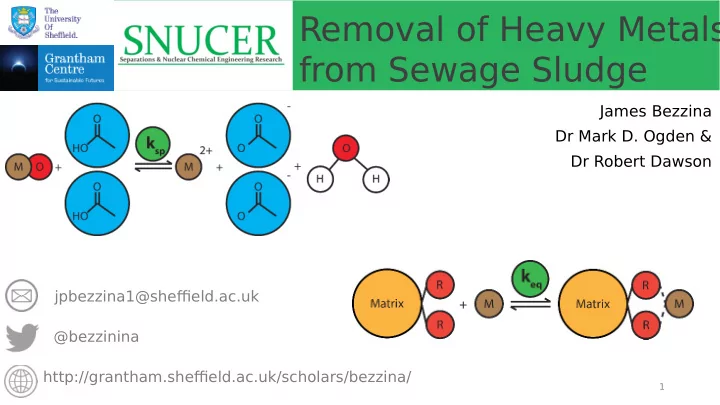

Removal of Heavy Metals from Sewage Sludge James Bezzina Dr Mark D. Ogden & Dr Robert Dawson jpbezzina1@sheffjeld.ac.uk @bezzinina http://grantham.sheffjeld.ac.uk/scholars/bezzina/ 1
Why Sewage Sludge? Global average consumption of: • ~2750 kcal/person/day in 2005/2007 • >3000 kcal/person/day in 2050 ~50% increase in consumption! • Mostly phosphate rock ~80% NH 3 Harber-Bosch • • Finite mineral • • 1.1592x10 13 MJ in 2013! Predicted reserves max 130 years • 28% of the N • 44% of the P 2
Heavy Metals [1] Westerhofg et al. 2015 [2] Vriens et al. , 2017 [3] Stevens, 2009 [4] Liu et al. , 2010 [5] Hsiau and Lo, 1998 3
Hydrometallurgy • Weak acid leaching • Stabilise metals at higher pH • Cheap, waste materials • No fjltration • Ion exchange is unknown in weak acid media 4
Ion Exchange • Small, functionalised polymer beads • Ion exchange kinetics are fast • The efgect of complexing materials (such as the weak acids) is not well understood with respect to IX material • Working backwards approach 5
Resin Screening Acetate Lactate Citrate Cu Fe Pb Zn 6 J. P . Bezzina, et al., Water Research, 2019
Extraction by MTS9301 • High affjnity for all metals, increasing with pH • High affjnity for Pb and Zn, increasing with pH Lactate Citrate Acetate • High affjnity for Cu, Zn affjnity increasing with pH • Pb shows high change with citrate species J. P . Bezzina, et al., Water Research, 2019
Leach the Metals from Sludge • Lower acidity required to stabilise metals due to complexation • Environmentally safe acids • Less cost in the neutralisation of the effmuent • Leaching kinetics are slow 8
Acetic Acid Leaches • Simulant sludge used for experiments • Extremely fast leaching of zinc • Slow leaching of lead and copper • Oxidants or reductants can be added depending on speciation
Mineral Refjnery Overview Leaching Ion Process Exchange • Lixiviant • Metals stabilised • Mineral on resin surface • Oxidant/Reduct • Generates the ant “clean” liquid Filtration • Subject to blinding with Elution organic matter • Leaves a and dewatered Precipitati sludge on
Resin-In-Pulp • pH 1.0; 24 hours • Ambient temperature • 0.5 M acetic acid • pH 4.5; 24 hours • Ambient temperature • 2:100 resin:slurry 11
Thank you! 12
Recommend
More recommend